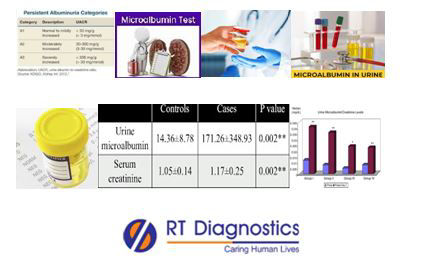Micro-albumin Test:
Why Micro-albumin Test?
CLINICAL INFORMATION
Albumin is a blood protein present in the body. It is used for cell growth and for tissue repair. Usually, albumin is not excreted in the urine, while in certain abnormal conditions low molecular weight albumin tends to get excreted in pathologies related to kidneys known as albuminuria. Healthy kidneys do not excrete any proteins, because the molecular weight of proteins is much higher than the pore size of the glomerular filters in the kidneys (nephrons). But when the kidneys are exposed to any pathologies then the kidneys tend to excrete protein in the urine that is most often referred to as micro-albuminuria. A Complete Urine test is also called a Urinalysis or Urine Analysis (UA). The test principle of this test is to analyze the physical (Color, Appearance, pH level), chemical (Protein, Sugar, and Ketones) properties and microscopic (Red Blood cells, Pus cells and other microbes) analysis in a patient’s urine sample specimen. This test measures the various components of urine for detecting systemic pathologies, kidney associated diseases such as Urinary Tract Infections (UTI) etc. Urinalysis is indicated in certain pathological conditions such as reduction in urine volume (scanty urine), itching during micturition, frequent burning micturition, the urgency with the incomplete evacuation of urine, change in the normal colour of urine, dribbling or the dripping of urine, loss of urine stream, incontinence etc. Some of the possible infections are interstitial cystitis, pyelonephritis (UTI ascending to kidneys causing the infection), renal lithiasis, calculi in the urinary bladder, kidney failure etc. Other associated diseases that may require urinalysis are diabetes, STDs, certain cancers etc. In case of abnormal urine e.g. Cloudy or milky urine in urinary tract infections (foul smell) and or filariasis (chyluria – block in lymphatic circulation resulting in excretion of lymph in urine), alkaptonuria (black urine due to homogenetic acid - an inborn errors of metabolism), maple syrup urine disease (high keto acids in urine). Moreover, this test includes all routine biochemical tests and also microscopic examination for fats, crystals (stones or calculi), casts, WBCs or RBCs and /or mucus in urine. The liver synthesizes the proteins required for the body (eg. enzymes, hormones etc) from the food we consume. If the result indicates an abnormal amount of albumin levels (usually hypoproteinemia), it may suggest nutrient deficiency or pathologies related to the liver or kidneys. This albuminuria test also known as the Microalbumin test checks the levels of albumin in the suspected urine sample specimen of the patient. Micro-albumin test screens to detect early signs of kidney damage in patients who are at risk of developing kidney pathologies. Additional confirmatory tests (such as enzyme assays, molecular analysis, etc) as a support and to rule out other differential diagnoses. Other tests include PCR, ELISA, blotting techniques, and liquid chromatography – Tandem Mass Spectroscopy (LC-MS/MS).

General Instructions:
Sample Requirement: Specimen –Urine Sample. Test Preparation: None.
NOTE - Sample for specimen collections may vary based on the patient’s condition/cases according to the patient’s presenting complaints/signs or symptoms:
SPECIMEN REQUIREMENT (Special or Rare Cases) - As instructed and guided by Physician / Clinician / Pathologist / as per Laboratory’s requirements, according to procedures and protocols.
This Multi-Specialty Clinical Referral Laboratory RT DIAGNOSTICS provides precise and accurate tests with an extensive range of testing services to the medical centres to help in the diagnosis and identification of pathology in the test specimens for infectious diseases and also to evaluate the function of organ systems of the patient. It prevents further complications and helps to stabilize and restore health to near normalcy at the earliest without delay.



